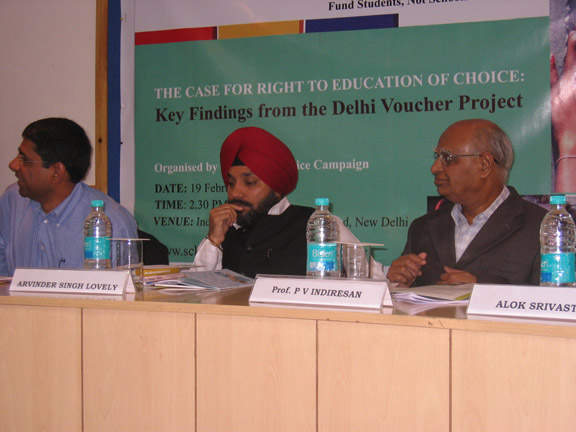 |
|
|||||||||||||
|
||||||||||||||||||||||||||
|
||||||||||||||||||||||||||
The Case for Right to Education of Choice: Key Findings from the Delhi Voucher Project
 |
 |

|
 |
 |
|||||||
CCS's flagship project, the School Choice Campaign (SCC) launched India 's First School Voucher Pilot, the Delhi Voucher Project in 2007 in the presence of Hon'ble Chief Minister of Delhi , Ms Sheila Dikshit and Hon'ble Education Minister of Delhi , Mr Arvinder Singh Lovely. The first third party evaluation of the project and its impact on the education of the 408 students who are part of the pilot was conducted by the Centre for Media Studies which has brought to light some interesting findings that question the way public funds are used for education in the country.
SCC organized The Case for Right to Education of Choice: Key Findings from the Delhi Voucher Project to officially release the Delhi Voucher Project First Assessment Report at the India Islamic Cultural Centre on 19 February 2009. The report was released by Hon'ble Education Minister of Delhi , Mr Arvinder Singh Lovely in the presence of the media, voucher school principals, noted academicians, SCC supporters and relevant members of the Delhi State Government.
"The improvement experienced by government schools is largely because of good officials, we don't know how long this will last. The Voucher idea is very good. In future students will have to be funded instead of schools. The Delhi government will use the voucher idea soon to help poor parents to cope with increase in fees as a result of the recommendations of the Sixth Pay Commission." said Hon'ble Minister Lovely.
Noted liberal thinker and President of centre for Civil Society, Dr Parth J Shah made a presentation on the School Choice Campaign and the Delhi Voucher Project bringing to light the importance of the Right to Education of Choice for all, and the role of competition in bringing in more transparency and accountability in the education sector, thereby improving the overall quality of education. "One idea that the Delhi government should adopt immediately is funding all new government schools on a per pupil basis through vouchers," said Dr Parth.
Mr Alok Srivastava, Research Director and Team Leader of CMS Social at Centre for Media Studies made a presentation on the key findings of the Delhi Voucher Project which further shed light on the role of Choice in empowering poor parents in responsibly schooling their children.
Former Director of IIT Madras and a School Choice Ambassador Prof P V Indiresan who has also been honored with a Padma Bhushan for his contribution in the field of Science and Electronics in the year 2000 spoke about the great potential of vouchers in ensuring accountability. He raised the issue of whether "the ministers and senior government officials would send their children to the schools they run?"
Presenting the Voucher School Principals Perspectives on School Choice were Mr V K Puri, Principal, Shishu Mangal Public School and Mr Ramswaroop Sharma , Principal, Sharda Vidya Kendra.
About School Choice Campaign
The School Choice Campaign (SCC) was launched in 2007 and is a campaign to bring about the much-needed reforms in the system of school education in India today using the three pronged approach of Education Vouchers, Regulatory Reforms and Encouraging Edupreneurs. School Choice Campaign seeks to achieve Right to Education of Choice for All. We believe that while the government has a constitutional mandate to educate every child, it cannot accomplish this task by building more government schools. It has to remain a sponsor and facilitator, and let edupreneurs execute the task of delivering the service. This will bring choice of schools even to the poor while improving the quality of education delivered through competition. Thus our slogan "Fund Students, Not Schools".
As part of our Delhi campaign, School Choice Campaign and Shiksha, a renowned NGO, collected 2, 80, 000 signature petitions from 68 wards of Delhi . These petitions were also presented to the minister requesting him to act upon the demand from the people.
SUPPORT US |
||||||||
|
||||||||
EVENTS |
||||||||
|
||||||||









